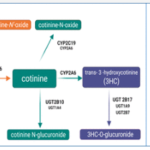アフリカでは風邪のウイルスが多いため、Covid-19による死亡率が比較的低いことが、ジンバブエの人々を対象とした研究で示唆された。 The higher prevalence of common cold viruses in Africa may have helped the continent experience relatively lower death rates from Covid-19, a study of people in Zimbabwe suggests.
2023-02-16 エディンバラ大学
◆アフリカは、世界の呼吸器感染症による死者の3分の1以上を占めており、コロナウイルスやその他の病原体が、世界の他の地域に比べて高いレベルで循環していることが示唆される。
◆保護免疫:この研究は、1年以上持続する抗体による交差免疫が、アフリカのCovid-19による死亡者数が予想より少ない理由の一部であることを示唆しています。
◆しかし、アフリカの人々のCovid-19感染、病気、死亡に対する抗体の効果を明らかにするためには、さらなる研究が必要であると研究チームは述べている。
◆より少ない死亡者数:アフリカにおけるCovid-19の感染率は非常に高いにもかかわらず、死亡者数は比較的少ない。その理由として、アフリカ大陸の生活様式や気候、比較的若い人口などが考えられるという。
◆エジンバラの研究者が率いるチームは、もう一つの理由として、ヒトに感染する他の6種類の一般的なコロナウイルスにさらされたときに作られる抗体が、Covid-19ウイルスに反応するかどうかを調査した。
◆インフルエンザと肺炎で10人に1人が死亡するジンバブエで、2000年から2019年にかけて採取されたパンデミック前の血液サンプル339人から、研究チームはCovid-19に対する抗体を32%の集団で検出しました。
◆これまでの感染症:抗体の標的を分子学的および計算機的に詳細に解析した結果、多くは、風邪のウイルスなど、他の6種類のコロナウイルスに感染した際の免疫反応によって産生されたものであることがわかりました。
◆また、インフルエンザウイルスや、マラリアや睡眠病を引き起こす寄生虫など、他の病原体と闘うために産生されたものもあるようです。
◆検出された抗体には、Covid-19ウイルスの一部、例えばスパイク・タンパク質を標的とするものがあり、これはワクチンで防御免疫を誘導するために使用されているものです。
◆保存されていたサンプル:ヨーロッパにおけるいくつかの研究では、最初の症例が検出される前に採取された血液サンプルからCovid-19抗体が検出されています。しかし、これらの症例は、パンデミック宣言が出される前に、ウイルスが早期に検出されずに拡散したためとされています。
◆ジンバブエでは、2000年という早い時期に採取されたアーカイブ試料から抗体が検出されたため、このようなケースはありません。
<関連情報>
- https://www.ed.ac.uk/news/2023/cold-viruses-helped-curb-africa-covid-19-deaths
- https://www.thelancet.com/journals/lanmic/article/PIIS2666-5247(22)00295-6/fulltext
ジンバブエで採取したSARS-CoV-2前のヒト血清サンプルの7種類のヒトコロナウイルスすべてのペプチドとの反応性に関するペプチドマイクロアレイIgMおよびIgGスクリーニング:クロスセクショナルスタディ Peptide microarray IgM and IgG screening of pre-SARS-CoV-2 human serum samples from Zimbabwe for reactivity with peptides from all seven human coronaviruses: a cross-sectional study
Jordan Ashworth,Dayna Mathie,Fiona Scott,Yuvaraj Mahendran, Mark Woolhouse,Oda Stoevesandt,Takafira Mduluza, Francisca Mutapi
Lancet Microbe Published:February 15, 2023
DOI:https://doi.org/10.1016/S2666-5247(22)00295-6

Summary
Background
SARS-CoV-2 infections and deaths have been lower in Africa than in other continents, which could be attributed to previous exposure to other pathogens that induce protective cross-immunity or modify the immune phenotype. We aimed to identify and characterise pre-existing cross-reactive immune responses to SARS-CoV-2 in an African population.
Methods
In this cross-sectional study, we determined the prevalence of SARS-CoV-2 serological cross-reactivity of 339 previously collected pre-pandemic (2000–19) serum samples from adults living in four villages in Zimbabwe (Mupfure, Mutoko, Chiredzi, and Murewa). We tested samples with a COVID-19 rapid diagnostic test then screened for cross-reactivity with peptides from the proteomes of seven human coronaviruses. We compared peptide location, coverage, and intensity and matched peptides predicted to be B-cell epitopes to the Human Immune Epitope Database (HIED).
Findings
Pre-SARS-CoV-2 serum samples from Mupfure and Murewa showed an overall prevalence of cross-reactivity with the SARS-CoV-2 rapid diagnostic test of 31·9% (95% CI 26·93–37·11). Peptide analysis of samples from all four villages highlighted complex IgM and IgG response profiles against peptides in the spike, nucleocapsid, and polyprotein 1AB proteins across all coronaviruses. Interrogating SARS-CoV-2 peptides recognised by IgG and IgM from the Zimbabwean serum samples against the HIED showed that most were either unique to SARS-CoV-2 or shared only with other betacoronaviruses. However, some SARS-CoV-2 peptides shared motifs with antigens from pathogens endemic to Zimbabwe, including Trypanosoma spp and Plasmodium spp, plant and food immunogens, and human autoantigens.
Interpretation
The effect of these cross-reactive antibodies on SARS-CoV-2 infection or COVID-19 is unknown; however, these antibodies should be considered when interpreting SARS-CoV-2 seroepidemiology studies and evaluating outcomes of COVID-19 vaccine trials in Africa. This study also calls for further characterisation of SARs-CoV-2 immune phenotypes and responses in African populations.
Funding
Scottish Funding Council Global Challenges Research Fund Grant at the University of Edinburgh; UK National Institute for Health Research.


